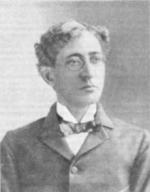Disable ads!
Timothy Thomas Fortune
Fortune moved to New York City in 1881 and began a process whereby over the next two decades he would become known as editor and owner of a newspaper named first the Globe, then the Freeman, and finally the New York Age. Upon arrival in New York, Fortune began working as a printer. He became part owner of various publications, ultimately founding the New York Freeman in 1884. That same year he published a book entitled Black and White: Land, Labor, and Politics in the South. Four years later The Freeman took the new name of The New York Age and set out to become "The Afro-American Journal of News and Opinion". In Chicago on January 25, 1890, Fortune co-founded the militant National Afro-American League to right wrongs against African Americans authorized by law and sanctioned or tolerated by public opinion. The league fell apart after four years. When it was revived in Rochester, New York, on September 15, 1898, it had the new name of the "National Afro-American Council", with Fortune as President. Those two organizations would play a vital role in setting the stage for the Niagara Movement, NAACP and other civil rights organizations to follow. Fortune was also the leading advocate of using "Afro-American" to identify his people. Since they are "African in origin and American in birth", it was his argument that it most accurately defined them. With Fortune at the helm as co-owner with Emanuel Fortune, Jr. and Jerome B. Peterson, the New York Age became the most widely read of all Black newspapers. It stood at the forefront as a voice agitating against the evils of discrimination, lynching, mob violence, and disenfranchisement. Its popularity was due to Fortune's editorials which condemned all forms of discrimination and demanded full justice for all African Americans. Ida B. Wells's newspaper Memphis Free Speech and Headlight had its printing press destroyed and building burned as the result of an article published in it on May 25, 1892. Fortune then gave her a job and a new platform from which to detail and condemn lynching. His book The Kind of Education the Afro-American Most Needs was published in 1898. He published Dreams of Life: Miscellaneous Poems in 1905. After a nervous breakdown, Fortune sold the New York Age to Fred R. Moore in 1907, who continued publishing it until 1960. Fortune published another book, The New York Negro in Journalism, in 1915.
 Read more on wikipedia.org Read more on wikipedia.org
 All quotes by Timothy Thomas Fortune All quotes by Timothy Thomas Fortune
 Edit Edit
|

|
|
|
|
|
Background photo by Giuliana
|